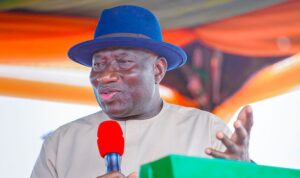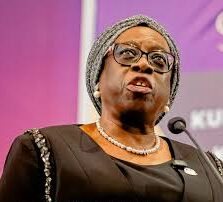Executive summary
“Nigeria’s peace is bigger than any one man’s ambition. The courts must enforce the Constitution, and the NJC must guard the bench from suspicion.”
Dr. G. Fraser. MFR. Founder, The National Patriots.
The 1999 Constitution (as altered) sets two separate ceilings on presidential tenure: (i) a hard “two-elections” bar, and (ii) a special one-term cap for anyone who first entered office by completing another person’s term. The latter was added in 2018.
The Supreme Court’s tenure jurisprudence (notably Marwa v. Nyako (2012)) is unequivocal: no one may remain in executive office a day beyond the cumulative constitutional limit; time in office begins to count from the first valid oath.

A controversial Federal High Court, Yenagoa judgment of May 27, 2022 (suit FHC/YNG/CS/86/2022) held Dr. Goodluck Jonathan was “eminently qualified” to run—primarily by treating the 2018 one-term cap as non-retroactive and by separating elections to Vice-President from elections to President. That view sits uneasily with the text and structure of Section 137(3) and with Marwa.
On the face of the governing texts and apex-court guidance, Dr. Jonathan is not eligible to run again. The proper forum to settle this conflict is the appellate courts. The NJC may investigate possible judicial misconduct if credible evidence exists, recommend disciplinary action against the erring Judge. The power to nullify a judgment lies with the appellate courts.
“No High Court ruling can override the Constitution or the Supreme Court. The appellate courts must overturn this matter quickly to prevent a constitutional crisis.”
— Dr. Gloria Fraser, MFR, National Patriots

The controlling law
1) The core disqualification rule (1999 Constitution)
The Constitution states under Section 137(1)(b):
> “A person shall not be qualified for election to the office of President if… he has been elected to such office at any two previous elections.”
This is the traditional two-elections ceiling that applies to any candidate.
2) The 2018 Fourth Alteration: the Yar’Adua/Jonathan scenario was specifically addressed
In Constitution of the FRN (Fourth Alteration, No. 16) (signed June 2018), the National Assembly inserted Section 137(3) to codify the rule for successors who completed another’s term:
> “A person who was sworn-in as President to complete the term for which another person was elected as President shall not be elected to such office for more than a single term.”
The consolidated, current text of the Constitution reproduces this language in Section 137(3).
Effect: Anyone who first became President by completing a predecessor’s term may run once—not twice. Dr. Jonathan was sworn in on 6 May 2010 to complete President Yar’Adua’s term, and then elected in 2011. That’s the one allowable election after succession. A fresh attempt in 2027 would exceed the cap Section 137(3) imposes.
3) The Supreme Court’s tenure logic: no time extension through technicalities
In Marwa v. Nyako (SC.141/2011, judgment 27 Jan. 2012), the Supreme Court resolved whether rerun victories and multiple oaths could extend a governor’s four-year tenure. The Court held tenure runs from the first valid oath, and office cannot be extended “by the back door.” Headnotes and analyses summarise the ratio:
Tenure is determined by the first oath; subsequent events (nullifications, reruns) don’t reset the clock.
The Court was emphatic that no person may remain in executive office beyond the constitutionally fixed maximum.
Why this matters here: Marwa’s logic rejects any interpretation that would let a person circumvent caps via sequencing (e.g., counting from a later oath while ignoring earlier constitutional service). It reinforces reading Section 137(3) strictly: once you’ve completed a predecessor’s term and then won one election, that’s the end of the road.
The conflicting Bayelsa FHC ruling—and why it doesn’t carry the day
A Federal High Court, Yenagoa ruling by Justice Isah (Hamma) Dashen on May 27, 2022 (Suit No. FHC/YNG/CS/86/2022) declared Jonathan qualified to contest (that case was about the 2023 cycle). From reporting of the unpublished judgment:
The Court framed the sole issue as whether Sections 137(1)(b) and (3) disqualified Jonathan, given oaths in 2010 and 2011.
It reasoned that election as Vice-President is different from election as President, so Section 137(1)(b) wasn’t triggered twice.
Crucially, it held Section 137(3) (2018) is not retrospective, so it could not impair a right “accrued” before June 7, 2018; on that basis, it concluded Jonathan wasn’t disqualified.
A contemporaneous report confirms the existence of the FHC Yenagoa ruling declaring him eligible for APC’s 2022/23 primary.
“The Bayelsa judgment raises troubling questions. The NJC should determine if it was a mistake or more. Judicial integrity cannot be compromised.”
Dr. G. Fraser. MFR. The National Patriots.

Three problems with relying on that 2022 ruling for 2027:
1. Hierarchy: A Federal High Court cannot override the Constitution’s text or the Supreme Court’s tenure line. If there is any friction, the Constitution and apex-court ratio prevail.
2. Prospectivity vs. applicability: Applying Section 137(3) to a future election (2027) is prospective, not retroactive. The disability operates at the time of nomination/election, long after the 2018 alteration came into force. The fact Jonathan could run in 2015 before Section 137(3) existed is irrelevant to whether he can run post-2018.
3. Integrated reading with Marwa: Even before 2018, Marwa made clear the Constitution forbids cumulative tenure beyond the limits and that the clock starts with the first oath. Section 137(3) tightened and clarified this principle for presidential succession.

Conclusion on the Yenagoa judgment: It is persuasive only at its level and contestable on the law now governing 2027. The proper, conclusive test is for the Court of Appeal/Supreme Court to reconcile Section 137(3) with past precedents.
What the appellate courts have already said about Jonathan’s 2015 run (context)

In 2013, Justice Mudashiru Oniyangi of the FCT High Court dismissed a suit seeking to stop Jonathan from re-contesting in 2015 and held he was eligible under the then-existing text. In 2015, the Court of Appeal (Abuja) affirmed eligibility, emphasising he had taken the oath as elected President only once (2011). Those rulings pre-date the 2018 alteration that inserted Section 137(3).
That history explains why 2015 was permissible—and why 2027 is a different case after the Fourth Alteration.
Comparative perspective: courts enforcing term limits
United States (22nd Amendment): The text is explicit:
“No person shall be elected to the office of the President more than twice, and no person who has held the office… for more than two years of a term to which some other person was elected… shall be elected… more than once.” Courts and institutions treat this bright-line rule as binding, full stop.
Zambia: The Constitutional Court initially read “term” in a way that permitted President Lungu to run in 2021 because his first stint did not amount to a full term; subsequently, in 2024, the same court ruled he was ineligible for a further attempt—enforcing the constitutional limit despite political pressure. The lesson: appellate courts can and do close loopholes to uphold term limits.
Normative backdrop (African & global): President Barack Obama, at the African Union: “Nobody should be president for life… The AU’s strong voice can help ensure leaders abide by term limits and their constitutions.”
The Kofi Annan Foundation has repeatedly urged West African leaders to respect constitutional term limits as a bulwark against instability.
Ghana’s President Nana Akufo-Addo (2024 KAPS Forum): “I will not be joining the club of African presidents seeking an unconstitutional third term.”
These comparators underscore a consistent principle: term limits are bright lines; the judiciary should keep them bright.
Voices inside Nigeria
Political scientist Dr. Umar Ardo (who litigated aspects of this question in the Jonathan era) argues that Marwa v. Nyako and Section 137(3) together bar any return:
> “In all a governor (and president) has a maximum tenure of eight (8) years… no person… can remain in that office for a day longer than provided… The 1999 Constitution has no room for self–succession for a cumulative tenure exceeding eight years.”
He calculates Jonathan’s time in office (May 6, 2010 – May 29, 2015) as 5 years and 23 days; another four-year term would breach the limit.
(Note: That passage quotes Ardo’s article quoting the Supreme Court’s language; the Court’s core holding aligns with the tenure-cap analysis above.)
Anticipating the counter-arguments
Counter 1: Section 137(3) is “not retrospective,” so Jonathan is free.
Rebuttal: Applying Section 137(3) today to 2027 is prospective. The rule regulates future elections—it does not punish past conduct. Once it took effect in 2018, it governs nominations/elections after that date.
Counter 2: He’s been “elected” only once (2011), so 137(1)(b) isn’t triggered twice.
Rebuttal: Even if 137(1)(b) is not crossed, 137(3) is independently disqualifying for successors who completed a predecessor’s term. The Constitution uses two independent filters; breaching either is enough.
Counter 3: A High Court already “cleared” him in 2022.
Rebuttal: High Court decisions do not bind the appellate courts on constitutional interpretation, and a single-judge ruling cannot trump the text of Section 137(3) or the tenure logic in Marwa. If tested, the Court of Appeal/Supreme Court decides.
What the NJC can and cannot do

Can: The National Judicial Council (NJC) can receive complaints, investigate allegations of misconduct or impropriety against judicial officers, and recommend discipline or removal to the appropriate appointing authority, under Paragraph 21, Part I, Third Schedule and Section 153 of the Constitution.
Cannot: The NJC cannot nullify, vacate, or “expunge” a court judgment. Only appellate courts can set aside or overrule a decision through the judicial hierarchy. The Supreme Court in Elelu-Habeeb v. A-G Federation clarified the NJC’s role is disciplinary/administrative, not appellate.
Practical take: If there is credible evidence that the 2022 Yenagoa judgment was procured or tainted by misconduct, a petition may be lodged with the NJC for investigation. Separately, the Attorney-General, INEC, political parties, or a concerned aspirant/voter can (and should) test the point in the Court of Appeal, seeking a definitive pronouncement on Section 137(3) as applied to 2027.
Recommendation to the Bench and Bar
Treat Section 137(3) as a bright-line, self-executing bar for successors who have already had one elected term after completing a predecessor’s tenure.
Recognize Marwa v. Nyako as controlling tenure arithmetic: time begins at the first oath, and no combination of events may push anyone past the constitutional maximum.
Overrule, distinguish, or confine the 2022 Yenagoa ruling to its facts if and when it is raised to justify a fresh Jonathan candidacy in 2027. The appellate courts should resolve the conflict promptly to prevent a pre-election crisis.
Quotes
Constitution (2018 insertion): “A person who was sworn in as President to complete the term for which another person was elected as President shall not be elected to such office for more than a single term.”
Supreme Court tenure logic (Marwa): Tenure runs from the first oath; no extension beyond the constitutional maximum.
Obama (AU, 2015): “Nobody should be president for life… [Leaders must] abide by term limits and their constitutions.”
Dr. Umar Ardo: “The 1999 Constitution has no room for self-succession for a cumulative tenure exceeding eight years.”

Final word
On a faithful reading of the text (Section 137(3)) and the Supreme Court’s tenure jurisprudence, Dr. Goodluck Jonathan does not qualify to run again for President. The Bayelsa FHC 2022 ruling is, at best, a contestable outlier; it cannot supersede the Constitution’s later, clearer command or the apex court’s approach to tenure arithmetic. The cleanest resolution is for the issue to be taken—quickly—up the appellate ladder. And if there’s smoke around how that 2022 judgment was obtained, the NJC can test the air, but only the Court of Appeal/Supreme Court can finally put out the fire.
“The Bayelsa High Court ruling cannot stand as the last word on such a grave constitutional matter. The Constitution and the Supreme Court are clear on tenure limits, and it is the duty of the appellate courts to put this controversy to rest once and for all. Nigeria cannot afford the instability of another constitutional crisis. The NJC, on its part, should examine the dynamics of how that judgment was delivered — whether it was an honest error or influenced by inducement — because the integrity of the judiciary is at stake. No individual ambition, not even Dr. Jonathan’s, is worth undermining the supremacy of our Constitution.”
— Dr. Gloria Fraser, MFR, National Patriots

Sources (selection)
Constitution of the FRN (1999, as altered): s.137(1)(b) and s.137(3) text (PLAC consolidated PDF).
Fourth Alteration (No. 16) 2018 (PLAC): inserting s.137(3).
Marwa v. Nyako (2012) Supreme Court – tenure counted from first oath; no extension.
FHC Yenagoa (FHC/YNG/CS/86/2022) – reported excerpts and holding.
NJC powers (Third Schedule, Part I, para 21) and scope.
US 22nd Amendment text.
Obama AU address (term limits).
Zambia term-limit enforcement.
Research & featured article by Princess G. Adebajo-Fraser MFR.
Founder, The National Patriots.




